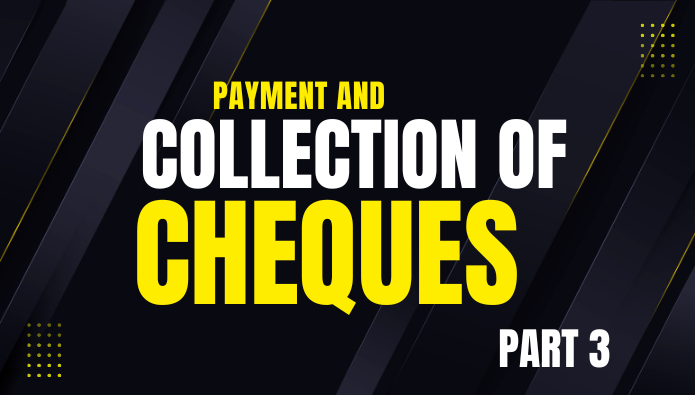Ever wondered what happens after you deposit a cheque in your bank? Or why some cheques bounce while others don’t? Understanding negotiable instruments is crucial for every banker, business owner, and even common people handling financial transactions.
📚 JAIIB Study Resources 📚
👉 Check Here
👉 Check Here
👉 Check Here
👉 Get Tests Here
👉 Check Here
- Responsibilities of a Collecting Banker
- Types of Endorsements & Their Impact
- Different Types of Cheque Crossings
- Legal Aspects & Case Laws Related to Cheques
- Section 138 – Dishonor of Cheques & Penalties
💡 Watch the full video and comment below with your questions!
👉 Before we dive in, watch this video for a complete breakdown:
Collection & Endorsement of Cheques: A Complete Guide
📌 Duties & Liabilities of Collecting Banker
- A collecting banker is responsible for collecting cheques, promissory notes, and similar financial instruments on behalf of customers.
- They must verify the legitimacy of the cheque holder before crediting the amount.
- If a cheque is collected fraudulently, the bank can be held liable for wrongful conversion.
- Example: If a company cheque is mistakenly credited to an individual director’s account instead of the company’s, the bank is legally responsible.
📌 Protection for Collecting Banks
- Collecting banks can protect themselves by ensuring KYC compliance and verifying the entity.
- Crossing the cheque (general or special) increases security and reduces fraudulent encashment.
- The bank must act in good faith and without negligence to claim protection.
📌 Understanding Endorsements & Their Types
What is an endorsement?
When the holder of a negotiable instrument signs and transfers it to another person.
- Blank Endorsement: Just a signature – makes the cheque a bearer instrument.
- Full Endorsement: Specifies the name of the person to whom the cheque is endorsed.
- Conditional Endorsement: Payment is subject to certain conditions (not enforceable by banks).
- Restrictive Endorsement: Restricts further endorsement (e.g., “Pay to Ramesh Only”).
- Facultative Endorsement: Waives the requirement of dishonor notice.
- Sans Recourse Endorsement: The endorser waives their liability in case of dishonor.
📌 Importance of Proper Endorsement in Banking
Proper endorsements ensure that financial transactions remain secure, traceable, and legally valid. Misuse or wrongful endorsement can lead to financial losses, fraud, and even legal complications.
By following the correct endorsement techniques, banks, businesses, and individuals can avoid unnecessary legal disputes.
📥 Download PDF Notes
Missed something? No worries! Download the complete PDF guide with notes from this session.





